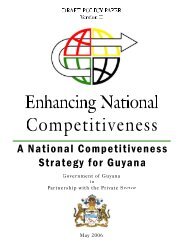Business Removing
Doing Business in 2005 -- Removing Obstacles to Growth
Doing Business in 2005 -- Removing Obstacles to Growth
- No tags were found...
You also want an ePaper? Increase the reach of your titles
YUMPU automatically turns print PDFs into web optimized ePapers that Google loves.
CLOSING A BUSINESS 71<br />
operations in the next year. Time to go through bankruptcy<br />
was cut by 15%.<br />
Some reforms made matters worse, increasing delays<br />
and reducing recovery rates. Exit became harder<br />
in Turkey and Uzbekistan in 2003. Turkey adopted a<br />
postponement procedure, which gives the creditor two<br />
years to implement a plan before creditors can start liquidation.<br />
This was done to alleviate the burden on businesses<br />
during the latest financial crisis. Time for<br />
insolvency jumped by a year, and recovery rates fell by<br />
15 cents. Uzbekistan created a reorganization procedure<br />
with a 3 month stay on creditors and an additional<br />
level of appeals, increasing delays by 9 months and cutting<br />
recovery rates from 17 to 12 cents on the dollar.<br />
What to reform?<br />
Doing <strong>Business</strong> in 2004 recommended three ways to improve<br />
the closure of businesses. First, use simple exit<br />
proceedings in poor countries and resist copying the<br />
complex bankruptcy systems of OECD countries. Second,<br />
involve creditors in decisions throughout the bankruptcy<br />
process. Third, provide continuous training for<br />
judges and bankruptcy administrators. This year five<br />
more reforms have been identified:<br />
• Improve foreclosure in poor countries.<br />
• Speed up liquidation in middle income countries.<br />
• Provide specialized expertise.<br />
• Limit appeals.<br />
• Pay administrators for maximizing the estate value.<br />
Improve foreclosure in poor countries<br />
Countries like Armenia, Ethiopia, Kenya, Nepal, Nigeria,<br />
and Paraguay have focused on improving the efficiency<br />
of their foreclosure procedures. Anything more complicated<br />
would increase delays, reduce recovery rates, and<br />
create opportunities for corruption.<br />
Foreclosure can be improved by reforming secured<br />
transactions law to allow summary proceedings, out of<br />
court enforcement, and limited appeals. Poor countries<br />
should also ensure that liquidation or reorganization<br />
does not stop foreclosure. This can be achieved by having<br />
creditor consent before the business enters bankruptcy,<br />
as in China, Hungary and Kuwait. In the past,<br />
many countries’ laws stopped businesses from entering<br />
reorganization by mandating a large payment, say 30%<br />
of the outstanding debt, as a condition for entry into reorganization.<br />
This achieves the same outcome as creditors’<br />
consent but is more cumbersome to enforce.<br />
Some poor countries have introduced reorganization<br />
in bankruptcy before there is the demand or capacity<br />
to enforce it. If Belgium, Sweden and Switzerland<br />
didn’t need modern reorganization until the late 1990s<br />
(figure 9.4), why would Albania, Bosnia and Herzegovina,<br />
and Uzbekistan need it now? 13 Benin surely doesn’t.<br />
Its reorganization procedure has not been used once<br />
since it was introduced in 1998. Nor is bankruptcy used<br />
in many other OHADA countries—for example Central<br />
African Republic, Chad, Mali and Niger—which adopted<br />
a reorganization procedure at the same time.<br />
Reorganization is a complex procedure, and it will<br />
work well only with an effective judiciary, competent<br />
bankruptcy administrators and a liquid market for the<br />
assets of bankrupt firms. 14 Only rich countries have all<br />
these features. In developing countries, complex solutions<br />
make simple problems worse.<br />
Speed up liquidation in middle income countries<br />
Middle income countries, where businesses often have<br />
more than one creditor, will find a high payoff from<br />
making their liquidation procedures faster. If Botswana<br />
can close down a business in 2 years, so can Brazil,<br />
Egypt, Jordan, Slovakia, Slovenia, Syria and Venezuela.<br />
Estonia allows no appeals for entry into liquidation and<br />
has introduced a fast-track for liquidation proceedings.<br />
In 2000 Slovakia made liquidation more efficient by allowing<br />
the firm to operate as a going concern throughout<br />
the process.<br />
FIGURE 9.4<br />
Rich countries waited to introduce reorganization<br />
Income per capita in year of reform<br />
20,000<br />
15,000<br />
10,000<br />
5,000<br />
0<br />
Source: Doing <strong>Business</strong> database.<br />
Canada 1992<br />
Norway 1984<br />
Ireland 1990<br />
France 1985<br />
Costa Rica 1989<br />
Bulgaria 2000<br />
Albania 1996<br />
Georgia 2001<br />
Cameroon 1998<br />
Senegal 1998<br />
India 1986<br />
Uzbekistan 2003<br />
Vietnam 1990

















